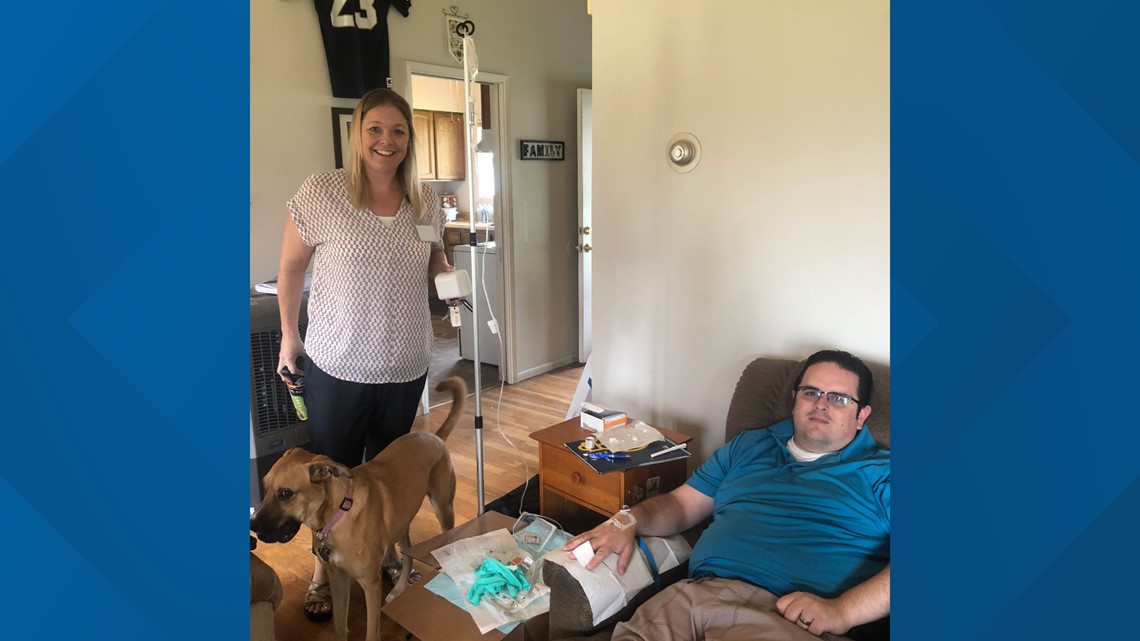SPOKANE, Wash. — During the novel coronavirus pandemic, even things like routine visits to the hospital are more complicated.
This is especially true for those battling diseases that compromise the immune system, leaving patients more susceptible to complications or serious illness if they catch COVID-19.
Robert Metzger, a local Navy veteran of six years with multiple sclerosis, was doing virtual visits with Spokane’s Providence Holy Family Hospital after coronavirus made it to the United States, but he said a change in doctors led to him being forced to choose potentially exposing himself to disease during in-person visits, or pushing back a new treatment for his MS.
“I think I may have to wait until spring. And I’m going to be playing roulette, a poker game, with my life, just so I don’t die before I can get treatment,” Metzger said.
Timing is everything for this new treatment, a drug known as MAVENCLAD. Metzger said it's best to carry out the treatment during lulls in disease cycles due to its effects on the immune system.
But for Metzger, there’s another important life event that makes the timing of his treatment even more important; his daughter starting her freshman year of high school.


KREM reached out to Providence to ask about Metzger’s situation and to see if anything could be done to allow him to see doctors virtually, as Metzger said he was told he needed to sign paperwork in person acknowledging the risks of the new treatment.
Jennifer Semenza, a Providence spokesperson, said in written statements to KREM that Metzger should reach out to the hospital again due to a misunderstanding.
“Please ask this individual to reach out to the clinic again. MS is a complicated disease and missing appointments isn’t in anyone’s best interest. We want to make sure they receive the care they need. The clinic manager was very upset to hear of this misunderstanding,” she wrote.
The good news about Metzger’s treatment? Metzger can now do his virtual visits after KREM reached out. The bad news? He still faces a long road of challenges.
Multiple Sclerosis diagnosis after two tours of duty
Metzger served two tours of duty with the United States Navy aboard an air craft carrier in the Middle East. When he returned home from his service, his doctors diagnosed him with MS, a disease where the body’s immune system attacks its own nerves.
His battle against the disease has only been complicated by the ongoing coronavirus pandemic. He goes through Spokane’s Providence Holy Family Hospital to receive treatment.
His normal neurologist started seeing MS patients virtually whenever possible when the coronavirus came to the United States, Metzger said, in an effort to lower their potential exposure to diseases that could be fatal for people with a compromised immune system.
In fact, Providence said they’ve conducted more than 450 virtual visits in the past four-and-a-half months.
But after his normal doctor went on maternity leave, Metzger said his treatment became more dangerous.
“I joke with my wife, I said its really sad I survived the war, going to war, to come back with MS, just to be possibly placed in more danger than I was in war by my doctors here in Spokane,” he said.


This was because, Metzger said, his fill-in neurologist wouldn’t see him virtually, demanding he wait until his normal neurologist was back or to go into the hospital for an in-person visit.
These worries increased when Spokane started seeing spikes in coronavirus cases numbers, but Metzger said he couldn’t make progress in getting back to virtual visits.
“When I had the go ahead and I reached out to them because we had a second spike I said, ‘Let’s do this virtually.’ They said, ‘No, we’re only seeing patients in office,’ I said, 'That’s very dangerous because, I'm immunocompromised.’ I said, ‘Is there any way that the doctor would do it?’ And she says, ‘No, she does not want to do virtual appointments, you would have to come in in person to sign.’”
Currently, Metzger said he needs to sign paperwork acknowledging the risk of the new treatment. Metzger’s MS has already compromised his immune system, but this next round of treatment will weaken it even further, he said.
“If I caught COVID, if I caught the flu, the cold, anything while I'm walking by an urgent care, which you have to walk by to go into the MS center, I could be killed just by one of those,” Metzger said.
Due to this, Metzger and his normal neurologist wanted to move forward with the steps needed before he started his new treatment, which would hopefully give him more mobility and/or decrease his chance of losing some bodily functions in the future, during the lull in disease cycles over the summer.
“That [visit] was planned in March, I followed through in July, beginning of July, and I was supposed to go in and see them in person, and that's when the things starting going, when I reached out to them and said, 'Hey, I need to have this virtual.’ And they refused to do it,” Metzger said.
But the timing is even more important to Metzger for another reason: his daughter is supposed to start her freshman year of high school this year. If she has the chance to do in-person classes in the fall, Metzger wouldn’t be able to risk having her go back if he was in the middle of treatment.
“My daughter, who was planning to probably go back to school in person, now cannot, if I was to go back on it. Because now, she could bring it home to me,” he said.


KREM reached out to Providence to ask about Metzger’s situation and why he was no longer allowed to do virtual visits.
Semenza said in a statement that in-person appointments are still the most thorough option for patients, but virtual visits are done as often as possible.
Her statement reads in full:
“The Providence Multiple Sclerosis Clinic has taken measures to ensure safety and protect the health of patients. While in-person exams continue to be the most thorough option for providers to evaluate patients with neurological conditions, we understand that some individuals may be hesitant to return visits in the clinic right now. As often as possible, virtual visits with a provider are made available for those with MS. We look forward to continuing to provide care for our patients in a traditional and virtual setting, and working with them to improve quality of life.”
Dr. Kenneth Issacs, who serves as Medical Director for the Spokane Providence Neurosciences Institute, also sent KREM a statement. Issacs explained that doctors can monitor patients more closely during in-person visits, but that Providence offers multiple options for patients to ensure safety and comfort.
Issacs’ statement reads in full:
“The Providence Multiple Sclerosis Clinic has taken measures to ensure safe care and protect the health of patients. Due to COVID, we quickly ramped up our virtual visit capabilities, and have provided more than 450 virtual visits since March. At times, especially for people with Multiple Sclerosis, in-person exams can be the most thorough option for providers to evaluate patients with specific neurological conditions. For example, we monitor how a patient is walking, check their eye sight and more. No matter what, we provide our patients with flexible options (virtual, in-person and phone calls) to ensure they're comfortable with their care options.”
Metzger reached back out to Providence after KREM asked about his situation. He can now do virtual visits again when possible, but the delay in moving forward with his treatment means he has to choose between keeping his daughter out of in-person classes in the fall, or waiting until next year’s lull in disease, and by then, his condition may have worsened.
But all in all, Metzger is happy progress was finally made.
“The fact that you reached out, I think, you know, it’s something that's really important and I really appreciate you. And I thank KREM, you guys are amazing. So, I appreciate it, Metzger said.
What to know about virtual visits
During the coronavirus pandemic, many medical providers, including those here in Spokane, have set up systems for both coronavirus and non-coronavirus medical patients to carry out visits virtually.
Providence said doctors try to meet with patients virtually when requested if possible.
More on Providence’s virtual care can be found on their website.
MultiCare also offers virtual care options for patients seeking to be seen without a physical visit, and more can be found on their Virtual Care website.
Community Health Association of Spokane (CHAS) also has Telehealth options available, which can be set up via phone at 509-444-8200 for patients in Washington or 208-848-8300 for those in Idaho. More can also be found at their website.
Have a tip for our investigative team? Email us at investigators@krem.com

